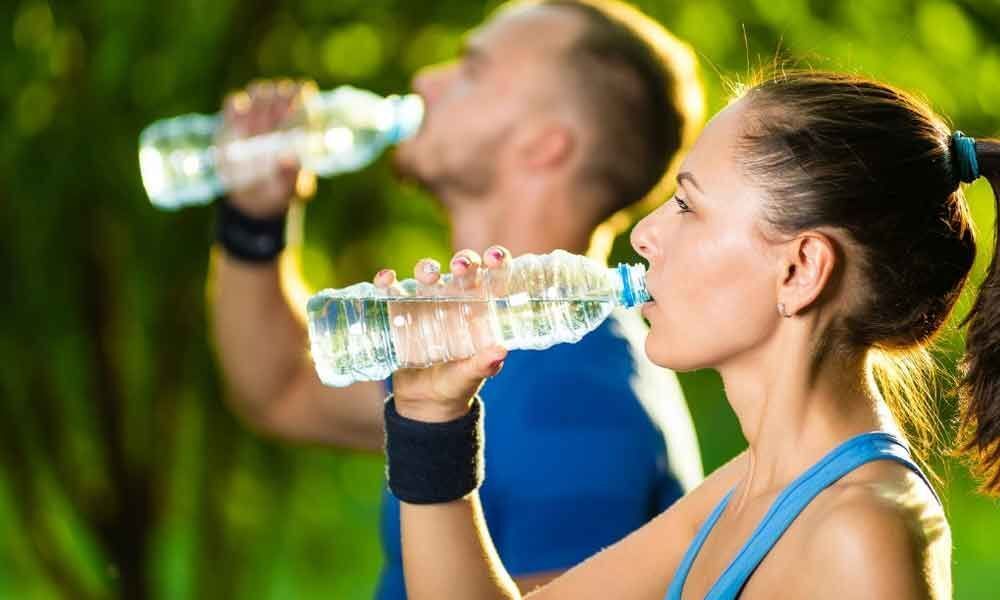What to eat before, during and after workout

One of the most important things to do during exercise is to hydrate and if your workout is 45 minutes or less, fluids may be all you need to keep you going.
Washington DC: While we all know that an intense workout can help you lose the right amount of weight, what you eat before, during and after you exercise plays a huge role in your fitness regime.
The right kind of food can make or break a workout routine and possibly affect the desired results. So what to munch on? According to experts, quality carbohydrates are important pre-workout and lean proteins post-workout.
Before you start with your exercise, eat carbohydrates, but not too much, said Nancy Cohen, a professor specialising in nutrition, reported CNN.
Cohen recommended consuming 1 to 4 grams of carbohydrates per every 2.2 pounds of body weight if you are planning to exercise for longer than an hour. Eating about an hour to four hours before working out is perfect for your fitness regime.
A review paper by researchers at the University of Sydney in Australia suggested that carbohydrate ingestion can improve endurance exercise performance. The paper was published in the 'Journal of Nutrition'.
The researchers assessed 50 randomised studies on carbohydrate ingestion and endurance exercise. The researchers found that the data in the studies provide evidence that consuming carbohydrates can enhance endurance exercise performance in adults.
"By eating carbohydrate-rich foods that are low in fat and low or moderate in protein, you can make sure you have enough muscle glycogen as fuel for your physical activity. This might include low-fat granola bars, fig bars, a peanut
butter and jelly sandwich, banana, yoghurt, pasta or other high-carbohydrate foods," Cohen said.
Staying hydrated is equally essential, consuming lots and lots of water can do the trick.
"Sufficient fluids are also important. In general, you can consume 5 to 10 millilitres of water per kilogram of body weight in the two to four hours before a workout," she said.
If you prefer to exercise in the morning, experts are divided on whether you should eat ahead of time.
It should be your own decision on whether to eat breakfast before or after exercise, said Stuart Phillips, a professor.
"I work out before breakfast every day because that's when I like to work out. I don't take in anything other than perhaps a cup of coffee most times or perhaps a slice of toast. My big breakfast comes after. But that's not to say that's good or bad. That's just what I do," Phillips said.
However, Cohen said that it's important to not make a habit of exercising on an empty stomach.
"If you haven't eaten in a long time, your body is in a fasted state. Normally, your body will use glucose for fuel and begin to break down muscle glycogen to deliver the glucose your body needs for exercise. In a fasted state, the muscle
glycogen will be depleted sooner. Your body will then turn to breaking down fats for the energy it needs," Cohen said.
"This can lead to ketosis, or keto-acid buildup in the blood, which can be harmful to the kidneys over the long term and cause fatigue and dizziness," she said.
"While exercising on an empty stomach may burn fat, it does not seem to be beneficial in the long run. And, if the fatigue means that you are not able to exercise at full performance, then you will also not be able to sustain as
effective a workout," she added.
So try eating eggs, cereal, and milk, toast with peanut butter, or fruit and yoghurt to fuel a morning workout.
One of the most important things to do during exercise is to hydrate and if your workout is 45 minutes or less, fluids may be all you need to keep you going.
"Depending on the sport and the comfort of the individual, a range of foods or beverages could be useful here," Cohen said.
So juices, sports drinks, granola bars, fruit, other high-carbohydrate foods, and drinks can be helpful during the workout.
After you workout, munch on protein, such as dairy products, eggs, meat, and poultry.
"After long or very high-intensity workouts, consuming 1 to 1.2 grams of carbohydrate per kilogram of body weight per hour for four to six hours, along with 15 to 25 grams of protein within the first hour after exercise, will
replenish muscle glycogen stores as well as support muscle protein synthesis," Cohen said.
"After lighter workouts, eat a well-balanced meal, including high-quality protein and carbohydrates, within two to three hours after finishing, and drink enough fluids to replace losses," Cohen added.
If you experience muscle pain after you exercise certain fruit juices, such as watermelon juice and cherry juice, can reduce muscle soreness after exercise.
All in all, a post-workout routine should include fluids to rehydrate, carbohydrates to refuel and protein to repair.
So now arrange a healthy snack to eat before your exercise and as soon as your workout ends! Also, remember to keep yourself hydrated by drinking loads and loads of water and other fluids before, during, and after exercise.














